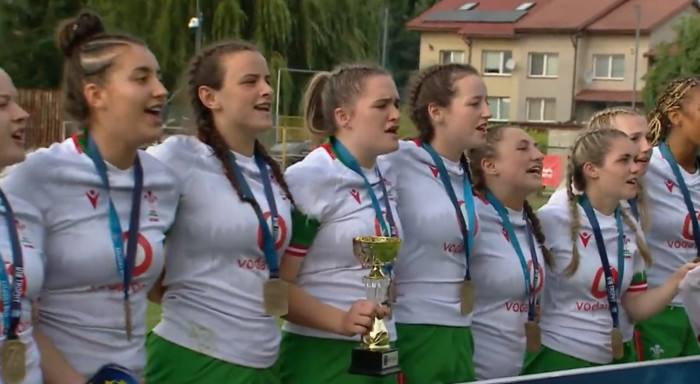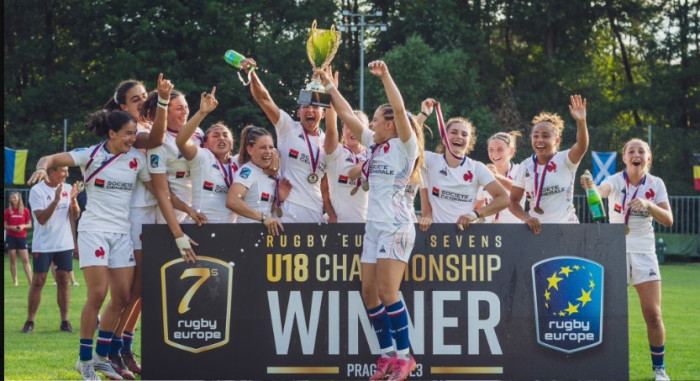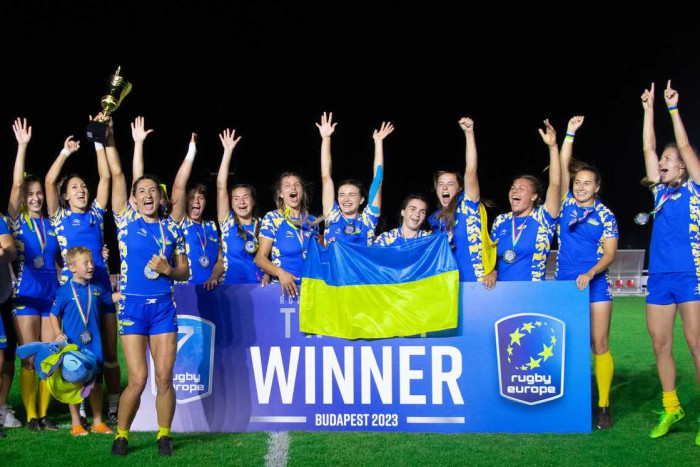European Women’s 7s Preview: Top 12
Next weekend will be busy one for European women’s rugby with 24 teams – all with a theoretical chance of Olympic glory – competing in the Division “A” and Top 12 tournaments in Bergen and Moscow.
Published by John Birch, June 6th, 2014
12 minutes read

The Top 12 will be again decided over two tournaments – this weekend in Moscow, and next weekend in Brive in France. It has a rare significance this year as the top two teams (other than England, Spain and Russia) will qualify for September’s Women’s Sevens World Series promotion tournament, where four teams will be selected to join the 2014-15 series.
The battle at the bottom of the rankings will also promises to be fierce as relegation from the Top 12 will almost certainly mean an end to any Olympic hopes, as they will probably be replaced in next year’s tournament by the top teams from Division A.
The lead-up to the series has been noteworthy in itself. Traditionally FIRA have divided the teams in their tournaments into two pools of six, instead of the WSWS (and probably Olympic) format of three pools of four, and the draw for Moscow was made and published along these lines some months ago. However, this month that format – which meant teams had to play one extra game on the first day - seems to have been changed and the tournaments will now follow the WSWS format.
As a result the revised pools (with seedings, based in last year’s positions) are now:
Pool A: Russia (1); Italy (6); Netherlands (7); Sweden (12)Pool B: England (2); Ireland (5); Portugal (9); Belgium (11)Pool C: France (3); Spain (4); Wales (8); Germany (10)
1. Russiaare one of three teams who have already qualified for next season’s WSWS and therefore might be expected to use the tournament to experiment, much as they have with recent WSWS tournaments. However defending their title on home soil will mean that Pavel Baronovsky’s charges will not be relaxing – and England found out in last year’s World Cup what a lift playing in Moscow can give to the Russian team. Injuries picked up in Amsterdam mean that not all of “Pasha’s” first-choice team were available for last weekend’s training camp, but Muharyamova, Bankerova, Kazakova, Kudinova and Bayzat Khamidova are all expected to be in the Moscow team and it’s hard to see them failing to live up to their seeding.
2. England,unlike Russia, have other priorities for the summer and have quite reasonably rested most of the players likely to feature at the XVs World Cup in August. The team selected for Moscow, while full of interest and ability, is very different to the one that visited the Russian capital for the World Cup a year ago. That said, this will be a great opportunity for these players to put down markers for the future. The headline-grabber is obviously thereturn of Jo Watmoreto the colours after a year away, but elsewhere the emphasis is on youth, no more so than the selection of 18 year-old Sydney Gregson for her first taste of senior England rugby. As for how this untried formation will perform in the tournament, their greatest problem is they have never played together before. If there are still together in Brive they could be a great team, but how they will perform in Moscow is almost impossible to predict – although a quarter-final place will be the minimum of their ambition.
3. Francehave a unique problem – the only XVs World Cup team in Europe who are also trying to qualify for the WSWS. As a result, and unlike World Cup rivals Spain and England, there is no room for experimentation. Over the two tournaments Francehaveto finish in the top two (discounting England, Spain and Russia) – and will almost certainly do so. Although they have arrived relatively late to the Olympic race, France have been improving, and above all becoming more consistent. The only significant problem they face this weekend is a self-Imposed one - the scheduling of the finals of the French club sevens in Châteauroux for the same weekend as the Moscow tournament. Despite that, and on current form, topping the pool and a semi-final place would be the minimum to be expected from the French team.
4. Spain, on the other hand, have qualified for the 2014/15 WSWS and it might be expected that they would have XVs and the World Cup firmly in their minds. The scheduling their clubs XVs finals for the week before the European championships, and the performance of the team in Amsterdam might suggest that. However Tomas Garcia has selected his strongest possible team for the series – including Barbra Pla who has recovered from the injury that forced her to miss Amsterdam, though Laura Esbri and Carlota Meliz are still unavailable. Spain appear to be taking this very seriously and as a result can be expected to finish in at least the top four.
5. Irelandwill still be without their leading players for this tournament, but – crucially – if they can qualify for the WSWS promotion series in September those players can be expected to be back, and a return to the World Series would be very possible. However, that will be a tough ask. There is no doubt that this young Irish team have learnt a great deal from the past year, culminating in their win over Spain in the final tournament, but this will be a real test. If the World Series was the learning experience, this will be the examination. For the first time they will not be the underdog and will be expected to at least finish second in their pool and reach the quarter-finals – which they should be able to do. But to achieve their target Ireland have to go beyond that – and that will be the real challenge.
6. Italyhave yet to make a significant attempt to prioritise international sevens. Although sevens is growing domestically, Italy have yet to make any impact on the international stage. Despite finishing consistently in the top half dozen teams in Europe they never played in the WSWS, and have not taken part in any major warm-up tournaments prior to this weekend. Given this it is hard to see beyond another mid-table performance from the Italians – they are unlikely to be troubled by relegation worries, but equally are unlikely to trouble the teams seeded above them.
7. Netherlandsare seeded a surprisingly low seventh for this series having used last year’s tournament to experiment. This year it is a different matter and, along with France and Ireland, the Netherlands will be targeting qualification for the WSWS promotion tournament. In many ways this series will be the core of their year – far more important than Amsterdam or any of this season’s WSWS tournaments. On paper they should succeed, but fragility under pressure has been a problem with the Dutch in the past – a problem that their new coach is well aware of, as exemplified by their loss to Brazil in Amsterdam. They should make the quarter-finals without difficulty – indeed they should be challenging for the title. Whether they will depends on their performance on day two, when the pressure is on.
8. Waleshave no Olympic aims, but certainly have the ability to upset those that do - Wales have won the European Championship in the past. They have recorded some impressive performances in warm-up tournaments leading up to this series, including reaching the final in Amsterdam winning the Rugby Rocks tournament in Richmond. They face a tough pool but could certainly make the quarter-finals as a best third, even if they did not upset one of their higher ranked opponents. Definitely a team to be wary of.
9. Portugalhave a strong tradition of sevens rugby and an impressive history in European women’s sevens tournaments. Involved since the first tournament in 2003, they have never been relegated from the top division. However, they have also never managed to make a significant breakthrough to challenge the leading teams, invariably finishing around midway in the rankings, while their only appearance in an IRB event saw them finish 10thin London in 2012. It is a situation not helped by their rare appearance in any significant tournaments outside FIRA which – while making them something of a mystery team – gives them few opportunities to prepare against new opposition. It is difficult to see this pattern changing, with the team probably challenging for the Bowl.
10. Germanyhave an international history dating back to 1989, but they dropped their test team and have concentrated on only sevens since 2010. Since then they have never played outside the Top 12. As their alter-ego the “Adler Sevens” they are also a common sight at sevens tournaments across Europe and harbour a real ambition to reach Rio. They certainly seem to be building to a peak with some good performances in tournaments leading up to FIRA, including reaching the final in both the Kinsale (narrowly beaten 15-12 by Wooden Spoon) and Centrale Sevens (where they ran a powerful Tribe team close, only losing 34-31), while at Amsterdam they were knocked out on day two by Wales. Given this preparation they will be hoping to improve on last season’s 10thplace, an ambition they should be capable of achieving. Whether they can go further and push for the top five finish that their Olympic ambitions require may be another matter.
11. Belgiumare delighted to be back in the top division for the first time since 2006, having swept to the Division A title last year and their target will be to avoid relegation. It’ll be a tough ask as the gap between the top two divisions has appeared to have grown rapidly. However, it would be unwise to underestimate Belgium who have prepared long and hard for this event, culminating in a semi-final place at Rugby Rocks, losing to Wales. Although a stronger team than last year, whether they will be strong enough to stay at the top remains to be seen.
12. Swedenhad an unbroken history of playing in the top division until 2012. They finished 10thafter a tough series, but were unlucky to be relegated to Division A for 2013 when Wales, Ireland and Scotland were included in the 2013 Top 12. However they immediately regained their place in the Top 12 by reaching the final, despite a shock defeat to Georgia on the way. Preparation for this tournament has been based around a series of six training camps since the start of the year, but Sweden have not taken part in any major warm-up competitions, other than some games against Denmark at the end of May. It is therefore hard to say how strong the Swedes will be, though staying at the top will be tough.


